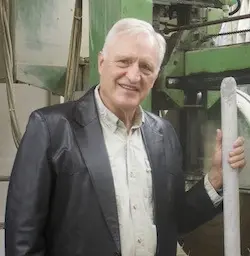
Steven R. Erbstoesser (BSMineE ’74, MSMineE ’75)
Owner, Global Operations and Management Advisors LLC; retired, ExxonMobil
Steven is an engineer, scientist and executive who, through caring and vision, has transformed organizations and led global teams to achieve world-class safety, operational and business performance in oil and gas operations.
Why did you choose engineering?
I always wanted to be a scientist—first depicted in crayon in elementary school when our teacher asked what we wanted to be. In high school, I learned about engineering from an expert who used science every day on the job to solve practical problems for our companies and society.
How did your experience in the College of Engineering influence your career path?
Interest in math and physics lead me to nuclear engineering at UW. I enjoyed nuclear engineering, but the industry had just sustained the Three Mile Island nuclear mishap and I worried that the nuclear industry might be threatened. At the same time, I was truly loving my summer job, which was drilling water wells in Sheboygan County. I enjoyed drilling, working with the earth, and dealing with the engineering and operational challenges of drilling wells. So, I changed majors to mining engineering, focusing on rock and soil mechanics—and specifically, hydraulic fracturing, or fracking, way back in the mid-70s! As a post-grad, I was charged with establishing the job-site drilling and operational capability of the fledgling UW hydraulic fracturing research effort led by Professor Bezalel Haimson. The UW prepared me well to make lifetime contributions in oil and gas drilling, exploration, production and projects.
Can you share are a few of your best memories from your time at UW-Madison?
Relationships I built with roommates, who were often colleagues as well, were precious. We were happy, worked hard academically, and scratched to get by financially. In fall, we hunted out in Stoughton, where farmers gave us permission to take rabbits, pheasants, ducks and even squirrel. One roommate was an absolute expert with pastries; he’d make pie shells, and we’d fill them with the results of our hunts, plus potatoes, celery, and carrots. Another roommate’s dad ran a cheese factory, so another staple was scratch macaroni and cheese. On Friday nights, I would make pizzas—sometimes all night long. We would only supply the pan, oven, dough, sauce and cheese topping (Manitowoc mozzarella). Everyone who came to our place brought the finer ingredients, and the pies were truly a smorgasbord.
Any family members you’d like to mention?
My wife and I have four wonderful daughters—two each from prior marriages. They’ve been great and supportive of my often being gone, missing birthdays, holidays or special events because I was in remote places, often tethered to them with only a cantankerous, early-generation satellite phone. Having their support made a huge difference.
Is there anything else you’d like to tell us?
Safety has been a career passion. Engineers learning to lead and manage safety is a critical component of our education and engineering curriculum. Engineers, particularly those who progress into management, play a pivotal role in establishing a company’s safety culture. Safety is not all about improving the OSHA numbers (incidents, lost-time, non-lost time, near-misses, etc). It’s all about people—caring for people, including our contractors and communities in which we operate. Ultimately, safety in the workplace carries over to family. Safety leadership is all about creating followers; these are folks who have heard your expectations on working safely, have seen your actions, and ultimately recognize that they are fully empowered and personally accountable to take the time needed to plan the job, manage the hazards, and work the plan. Knowing that management seriously cares translates into a belief that working safely is both possible and necessary. That belief translates into routinely taking safe actions, and these actions translate into fewer close calls, near misses, minor incidents, lost time incidents, and even fewer incidents with catastrophic outcomes. Embracing a “passion for safety,” caring, and leading teams has given me the ultimate satisfaction and reward. Creating safe work environments and a culture of excellence permeates everything that we as a team take on; it improves our business performance, and it saves the lives of those we touch.